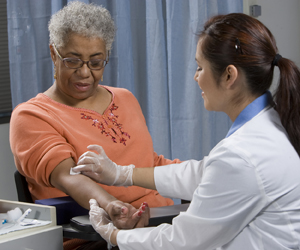Reducing Your Risk for Lymphedema After Breast Cancer Treatment
Reducing Your Risk for Lymphedema After Breast Cancer Treatment
After breast surgery or radiation, fluid may collect and cause swelling in the arm and chest on the side of the treatment. This is called lymphedema. The lymphatic system helps the body fight infection. It's made up of a system of small vessels throughout the body. Lymph fluid travels through these vessels. Many tiny organs called lymph nodes are scattered along the vessels. These nodes filter lymph fluid. Lymphedema can happen after lymph nodes and vessels under the arm are removed or the underarm area is treated with radiation therapy. The lymph nodes and vessels are damaged and the normal flow of fluids in the arm is reduced. To help reduce your risk of lymphedema, follow the tips on this handout. You are at risk for lymphedema for the rest of your life, so make these tips part of your regular habits.
Be careful of how much you use the affected arm
Carry purses and heavy packages with the arm on your non-affected side, or use both arms.
Don’t avoid using your affected arm. Use it like you normally would, but try not to overdo it.
Build strength in the affected arm with gentle moves such as making a fist. Talk with your healthcare provider about exercises that are safe to do and what your limits should be.
Keep fluid moving to prevent swelling
If at all possible, don't let anyone draw blood from your affected arm. Don't have injections or blood pressure tests on that arm.
Raise your affected arm above your heart when you sit or lie down.
Don’t wear tight sleeves, elastic cuffs, bracelets, wristwatches, or rings on your affected arm or hand.
Wear a well-fitted bra with straps that don't dig into your shoulders.
Protect your arm and skin from infection
Wear gloves when you garden, use harsh chemicals, or handle garbage.
Wash, treat, and cover even the smallest cut.
Use insect repellent to help prevent bug bites.
Use a clean razor on clean skin if you shave under your arms.
Don’t pick at, bite, or cut the skin around your fingernails. Use a cuticle stick to push your cuticles back.
Be careful to prevent sunburns and burns from cooking.
Keep your skin clean, and use lotion to keep it soft.
When to seek medical advice
Call your healthcare provider if your arm, hand, or chest is:
Swollen or red
Hot
Heavy
Painful
Tell your healthcare provider about any changes right away. Treating lymphedema soon can help keep it from getting worse.
Updated:
July 12, 2018
Sources:
Lymphedema after cancer surgery, Up To Date, Prevention and treatment of lymphedema, Up To Date
Reviewed By:
Gersten, Todd, MD,Image reviewed by StayWell art team.,Stump-Sutliff, Kim, RN, MSN, AOCNS
